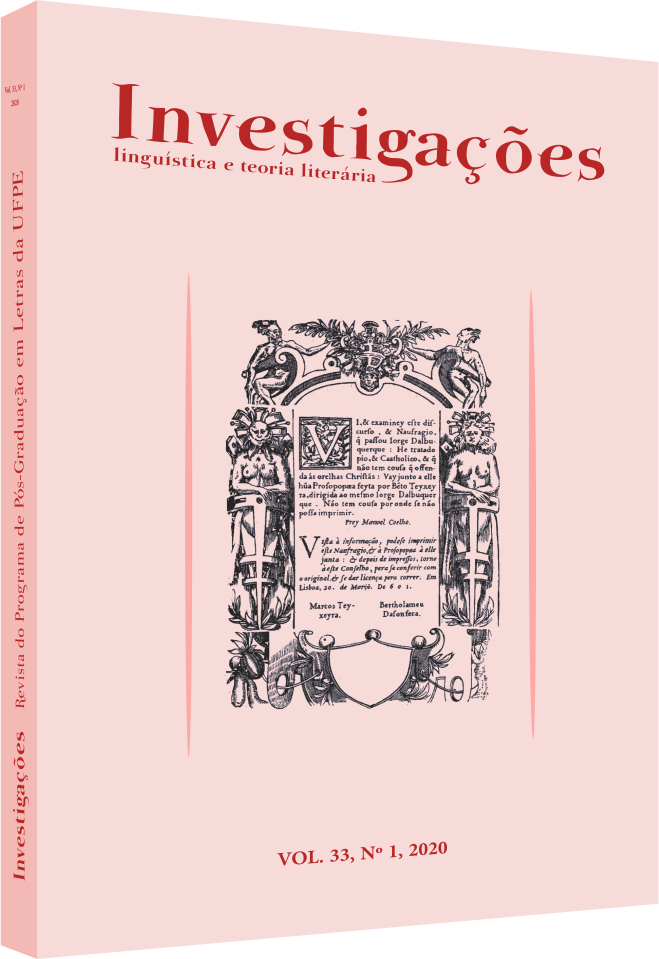“O tempo a indiferenciar-se, também”: uma leitura da configuração temporal de Finisterra. Paisagem e Povoamento
DOI:
https://doi.org/10.51359/2175-294x.2020.245108Keywords:
Finisterra, time, undifferentiation.Abstract
In this article, I focus on the semantics of temporal undifferentiation unfolded in Finisterre, one of the most innovative narratives of 20th century Portuguese fiction. This semantics becomes effective especially through the projection of a “time of representation”, through which historical time and duration time are weakened. Ideologically, the narrative allows to read time as an agent of the undifferentiation of a sociohistorical stage: in fictional entities such as the fog and the carnivorous plant, for example, that erode and devour the family space, the historical becoming materializes, which suppresses one way of life to bring out another.References
ALBER, Jan. Unnatural narrative. Impossible worlds in fiction and drama. Lincoln: University of Nebraska Press, 2016.
FLUDERNIK, Monika. How natural is ‘Unnatural Narratology’; or, What is Unnatural about Unnatural Narratology?. Narrative, v1, n. 20, 2012, p. 357-370. Disponível em: <https://www.researchgate.net/publication/236795805_How_Natural_Is_Unnatural_Narratology_or_What_Is_Unnatural_about_Unnatural_Narratology>. Acesso em 12 ago. 2019.
GENETTE, Gérard. Discurso da narrativa. Lisboa: Vega, 1995.
JAHN, Manfred. More Aspects of Focalization: Refinements and Applications. In: Pier, John (ed.). GRAAT: Revue des Groupes de Recherches Anglo-Américaines de L'Université François Rabelais de Tours, 1999, n. 21, p. 85-110.
JÚDICE, Nuno. Uma paisagem em construção. In: SILVESTRE, Osvaldo Manuel. Depois do fim. Nos 33 anos de Finisterra. Paisagem e Povoamento, de Carlos de Oliveira. Coimbra: Centro de Literatura Portuguesa, 2011, p. 15-24.
LEPECKI, Maria Lúcia. Carlos de Oliveira: entre narrativa e poesia. In: LEPECKI, Maria Lúcia. Meridianos do texto. Lisboa: Assírio e Alvim, 1979, p. 203-214.
MOURÃO, Luís. “O Agrimensor da sombra”. In: MOURÃO, Luís. Um romance de impoder. A paragem da história na ficção portuguesa contemporânea. Braga-Coimbra: Angelus Novus, 1996, p. 267-302.
NÜNNING, Ansgar. On the perspective structure of narrative texts: steps toward a Constructivist Narratology. In: PEER, Willie Van e CHATMAN, Seymor. New perspectives on narrative perspective. New York: State University of New York Press, 2001, p. 207-224.
OLIVEIRA, Carlos de. Finisterra. Paisagem e Povoamento. Lisboa: Assírio e Alvim, 2003.
PHELAN, James. Why narrators can be focalizers. In: PEER, Willie Van e CHATMAN, Seymor. New perspectives on narrative perspective. New York: State University of New York Press, 2001. p. 51-66.
REIS, Carlos. Dicionário de estudos narrativos. Coimbra: Almedina, 2018.
RICHARDSON, Brian. Narrative Poetics and Postmodern Transgression: Theorizing the Collapse of Time, Voice, and Frame. Narrative. Vol. 8, n. 1, 2000, p. 23-42. Columbus: The Ohio State University Press. Disponível em: http://www.jstor.org/stable/20107199. Acesso em 30 jul. 2019.
SEIXO, Maria Alzira. Escrever a terra – Sobre a inscrição do espaço no romance português contemporâneo”. In: SEIXO, Maria Alzira. A palavra do romance: Ensaios de genologia e análise. Lisboa: Livros Horizonte, 1986, p. 69-81.
Downloads
Published
How to Cite
Issue
Section
License
Copyright (c) 2020 Gisele Seeger

This work is licensed under a Creative Commons Attribution 4.0 International License.
Authors who publish with Revista Investigações agree to the following terms:
Authors retain copyright and grant the journal right of first publication with the work simultaneously licensed under the Creative Commons Attribution 4.0 International (CC BY 4.0) license that allows others to share the work with an acknowledgement of the work's authorship and initial publication in this journal.
Authors are able to enter into separate, additional contractual arrangements for the non-exclusive distribution of the journal's published version of the work (e.g., post it to an institutional repository or publish it in a book), with an acknowledgement of its initial publication in this journal.
You are free to:
Share — copy and redistribute the material in any medium or format for any purpose, even commercially.
Adapt — remix, transform, and build upon the material for any purpose, even commercially.
The licensor cannot revoke these freedoms as long as you follow the license terms.
Under the following terms:
Attribution — You must give appropriate credit , provide a link to the license, and indicate if changes were made . You may do so in any reasonable manner, but not in any way that suggests the licensor endorses you or your use.
No additional restrictions — You may not apply legal terms or technological measures that legally restrict others from doing anything the license permits.

